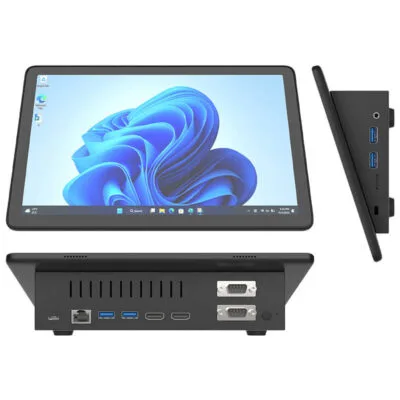POS Tablets in Emerging Markets: Opportunities and Challenges

Emerging markets such as Asia, Africa, and parts of Latin America are experiencing rapid economic development, with small and medium enterprises (SMEs) playing a pivotal role in driving growth. Among the tools transforming these businesses, tablet-based point-of-sale (POS) systems are becoming increasingly popular due to their affordability, adaptability, and efficiency. This article explores the opportunities and challenges of adopting POS tablets in emerging markets, provides insights into the evolution of POS systems in these regions, and highlights why GolePOS tablets are the ideal choice for distributors.
A Brief History of POS in Emerging Markets
The evolution of POS systems in emerging markets can be traced back to the following key milestones:
Early Adoption of Electronic Cash Registers (1980s-1990s): Small businesses began using basic electronic cash registers for recording sales. These systems were affordable but lacked advanced functionalities.
Transition to Desktop POS Systems (2000s): With improving economic conditions, larger retailers adopted desktop-based POS systems. However, the high cost and lack of mobility limited their penetration in SMEs.
Rise of Mobile POS Solutions (2010s): The proliferation of smartphones and wireless technology paved the way for mobile POS solutions. Emerging markets, particularly in Asia and Africa, saw increased adoption due to lower costs and ease of use.
Current Trend: POS Tablets (2020s): Tablet-based POS systems are now leading the charge, offering a perfect balance between functionality, portability, and affordability. These systems are highly customizable and cater to the unique needs of small businesses.
Opportunities in Emerging Markets
1. Growing SME Sector
Emerging markets are home to a booming SME sector. Small businesses, including retail stores, restaurants, and service providers, are seeking cost-effective solutions to manage their operations. POS tablets, with their lower upfront costs compared to traditional POS systems, are the ideal choice for these businesses.
For example:
In Southeast Asia, the SME sector accounts for over 90% of all enterprises, presenting a significant demand for affordable POS solutions.
2. Mobile and Internet Penetration
The increasing penetration of mobile devices and internet connectivity in these regions has created an ecosystem conducive to digital transactions. According to a GSMA report, mobile internet penetration in Sub-Saharan Africa is projected to reach 50% by 2025. This growth supports the adoption of mobile-friendly technologies like POS tablets, which are designed for wireless connectivity and mobility.
3. Demand for Lightweight, Flexible Solutions
Governments in emerging markets are actively promoting digitalization. For instance:
India: The Digital India initiative encourages small businesses to adopt digital payment solutions.
Kenya: The M-Pesa mobile payment system has revolutionized how businesses transact, driving demand for compatible POS systems.
These initiatives create opportunities for distributors to introduce tablet-based POS systems that align with local policies and consumer behaviors.
4. Government Initiatives for Digitalization
Unlike traditional POS machines, tablets are lightweight, portable, and easy to install, making them suitable for diverse environments, including street vendors, pop-up shops, and small retail outlets. This versatility gives tablets a competitive edge in markets with limited infrastructure.
Challenges to Overcome
1. Infrastructure Limitations
Power outages and inconsistent internet connectivity remain challenges in many emerging markets. POS tablet manufacturers and distributors must address these issues by offering devices with:
Long battery life.
Offline functionality for continued operation during internet downtimes.
2. Price Sensitivity
Businesses in emerging markets are highly price-sensitive. While tablets are generally more affordable than traditional POS systems, distributors must find ways to balance cost and quality to meet market expectations. Offering tiered pricing models or entry-level options can help address this concern.
3. Security Concerns
Data security is a critical issue as more businesses digitize their operations. Distributors must educate potential customers about the security features of POS tablets, such as encrypted payment processing and secure software updates.
4. Training and Awareness
Many small business owners in emerging markets lack familiarity with digital tools. Providing training sessions, user-friendly interfaces, and accessible customer support can significantly enhance the adoption rate of POS tablets.
What Makes a Tablet Suitable for Emerging Markets?
When selecting a POS tablet for emerging markets, consider the following factors:
| Feature | Why It Matters |
|---|---|
| Affordability | Cost-effective devices are essential for price-sensitive markets. |
| Durability | Tablets should withstand harsh environments and frequent use. |
| Long Battery Life | Essential in regions with unreliable power supply. |
| Offline Functionality | Enables businesses to operate without constant internet connectivity. |
| Customizability | Tailored features cater to the specific needs of local businesses. |
| After-Sales Support | Reliable support ensures long-term customer satisfaction. |
Why GolePOS Excels in Emerging Markets
GolePOS tablets meet all these requirements, making them an ideal choice for businesses in emerging markets:
Affordable Pricing: GolePOS offers competitive prices without compromising on quality.
Durability: Designed for longevity, these tablets are resistant to wear and tear.
Power Efficiency: Long battery life ensures uninterrupted operations, even in areas with frequent power outages.
Customizable Features: GolePOS provides ODM/OEM services, allowing businesses to tailor the tablets to their specific needs.
Reliable Support: GolePOS offers comprehensive after-sales support, ensuring a seamless user experience.
Advice for Distributors
1. Build Partnerships with Local Businesses
Collaborating with local businesses, such as software providers and payment gateways, can help distributors tailor solutions to regional needs. For example, integrating local payment methods like M-Pesa in Africa can make the product more appealing.
2. Focus on After-Sales Support
Reliable after-sales support, including training, maintenance, and troubleshooting, is essential to building trust and customer loyalty in emerging markets.
3. Leverage OEM/ODM Capabilities
Distributors can partner with manufacturers offering OEM/ODM services to create customized POS tablets tailored to the unique requirements of each market. GolePOS provides high-quality, customizable tablets that meet diverse business needs.
4. Highlight the Cost-Benefit Ratio
Distributors should emphasize the long-term cost savings of POS tablets, including lower energy consumption, reduced maintenance costs, and enhanced operational efficiency.
Summary
POS tablets are revolutionizing emerging markets by providing SMEs with cost-effective, efficient, and versatile solutions. Despite challenges like infrastructure limitations and price sensitivity, these devices offer unparalleled opportunities for growth and digitalization. GolePOS stands out with its affordable pricing, robust features, and reliable support, making it the go-to choice for businesses in these regions. By addressing local needs and leveraging government initiatives, distributors can unlock the full potential of POS tablets in emerging markets.





